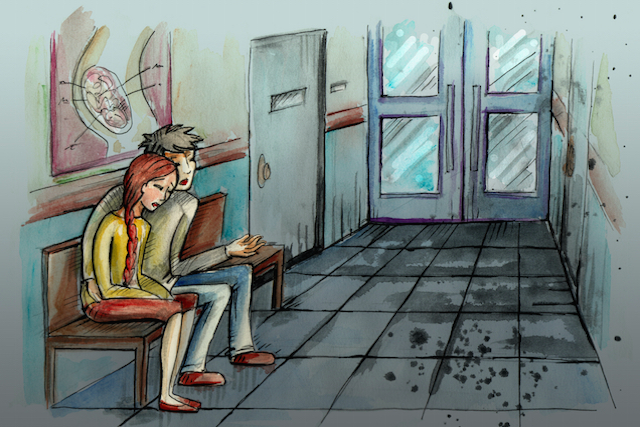
“We don’t know what’s causing it,” I say to friends for what feels like the hundredth time. My boyfriend has been unable to walk or stand without pain for two years. And no doctors can seem to figure out why.
We were in our early twenties and had only been dating for a few months before his leg issue started. What ensued was a harsh transition from a highly active couple hiking mountains on the weekends, to a sedentary couple that needed to take an Uber to a coffee shop just a few blocks away.
Our identities as individuals and as a couple were forced to adapt as we struggled to balance our budding relationship and the crippling reality of being unable to walk, bike, run, swim, or do any other form of physical activity together. But this wasn’t the only issue; other areas of our relationship struggled as well.
Our conversations became strained, our intimacy more limited. We had become much less carefree as we battled to adapt to our new constraints. My partner now seemed to lack the confidence and assuredness he once had, and my plans about how the relationship would grow suddenly had a huge wrench in them with no timeline for when things would get better.
Along the way I’ve shared our journey with others, and it turns out there are a surprising number of people with similar stories. Their partner was happy and thriving when they met, then they unexpectedly developed a debilitating medical condition that changed everything. I’ve heard examples of several friends whose partners have unexplained chronic pain, nausea, headaches, heart conditions, and more.
While these are personal anecdotes from my own small circle, I know we are not alone. There are millions of active Reddit threads and support groups in community forums by desperate partners reaching out the internet to answer “When will the person I fall in love with be back?”—“What is going on?!”
Every situation and relationship is different, and many have been enduring the struggle for much longer than the two years I have been, with much more life-threatening conditions. Hats off to you! However, I have learned a thing or two over the course of my journey that have helped me turn a corner in my relationship even though the issue is still going on.
Here are my top six tips for coping with a partner’s life-altering medical condition. In other words, here are things I keep telling myself in order to get through one of the hardest things I have ever experienced.
1. Stop planning for the day they get better.
In the first few months of our journey, I would create timelines in my head for when it seemed “reasonable” he would be better (“In three months it should be better, right?”… five months… a year, etc.). But those timelines were based purely in blind faith despite not even knowing what the problem was. I would set myself up for disappointment again and again while there was still no progress.
After enough failed treatments and milestones (birthdays, holidays) that passed when he still wasn’t better, I realized I needed to be open to the harsh reality that today’s medical system is not perfect: it’s slow and often trial-and-error, especially if the doctors aren’t sure what the issue is. There is no time he “should” be better.
Releasing myself from these expectations, and the pain they created, allowed me to stay more level-headed and focus on the things we can control and enjoy in our relationship.
2. Do your own research.
Google everything, study the anatomy of the body, familiarize yourself with Western vs. Eastern medical treatments, take a minute to focus on a dense, peer-reviewed medical journal, educate yourself. This will help with #1, as you will know what is going on, why it’s complex, and why it’s taking so long to figure it out. Knowledge will give you peace of mind.
You will be able to meaningfully contribute to conversations with your partner as they navigate their appointments and decisions. As a result, you will feel more involved in the journey rather than victimized by it. It’s something you are doing together, and you are empowered to help each other since you are both experts in all the possibilities of what the issue may be.
3. Seek out others in your situation.
For the first year or so, I felt entirely alone on the journey. It felt like a secret struggle between my partner and me that my friends and family didn’t understand, or they assumed it was probably better by the next time they asked about it. Finding friends who were going through something similar was instantly comforting.
With them, I can speak more freely about the emotional toll it is taking on the relationship, swap stories of failed doctor’s appointments, and discuss the next thing we are trying. Hearing about someone else’s unique story has helped provide perspective and get outside of my own head on my relationship.
If you don’t have any friends going through the same thing, I found a couple people online here and here. Seeing them struggle with their own medical journeys inspired me to stay strong and keep going.
4. Grow the parts of the relationship that you still can.
As much as it seems like your partner’s issue is taking up all the space in the relationship, remember there are still other aspects of the relationship that are ready and willing to grow. Try your hardest to not talk about the medical issue all the time. Set up a regular check-in cadence on how you and your partner are feeling about the situation, and spend time outside of that enjoying life together.
Find new activities to do together, new hobbies to be into together, new conversations you may not have gotten into otherwise. Don’t be ashamed if the activities you do with your partner aren’t exactly what you thought you’d be doing or what your friends are doing with their partners. Cherish your special relationship with one another.
5. Own your choice to stay in the relationship.
You may struggle with whether or not you should stay. If you are still in your relationship despite the way the medical issue has changed it, you have likely developed a rationale for why it makes sense to stay, such as “It’ll get better soon so I just need to stick it out,” or “I don’t believe in leaving when there are hard times,” or “We have kids who need us.”
While those things may be true to you, they represent more about your personal belief system than anything else. This is how you choose to look at the issue, and, in turn, why you choose to stay. In reality, you are not obligated to stay. You do it because you want to do it. This self-awareness will free you from feeling stuck, or like you “have” to be there. It will help you to focus on why you are staying and validate that choice.
6. Be proud of yourself.
This is tough! Pat yourself on the back for what you can do and the little wins you have along the way. You and your partner are both learning together, and you should be proud of yourselves individually and as a couple. While these situations can create friction that drives you apart, it’s actually not you two versus each other—it’s you two versus the problem. Stick together and lean on each other. You’re doing a great job.
About Emily Dreibelbis
Emily lives in Seattle, Washington. She is a first-time contributor to Tiny Buddha.













 Though I run this site, it is not mine. It's ours. It's not about me. It's about us. Your stories and your wisdom are just as meaningful as mine.
Though I run this site, it is not mine. It's ours. It's not about me. It's about us. Your stories and your wisdom are just as meaningful as mine.
Thank you for this article, Emily. Neither my husband or myself is in this situation right now, but it could happen to anyone at any time. I appreciated your thoughtful recommendations and insights.
Thank you, Mary! Appreciate your thoughts and for reading my story.
Emily, would you please get in touch with me privately? This article is so timely. My son and his girlfriend are in a very similar situation, and they are in Seattle. info@lifesupportsme.com Thanks.
Absolutely! I will email you now.
I never got anything, but that’s okay. My son has had a miraculous turn-around. He hung around at death’s door for a few days but seems to have made an almost full recovery (a HUGE surprise given the brain damage they saw on the CT scans). Neither he nor his girlfriend feel they need any additional outside support. Thank you, and I wish you the best. 🙂
Thank you for this. My situation is a little different. I am the primary support for my 87 year old dad whose world has been severely limited by dementia. He is in a close by long term care facility. I visit almost daily. He recognizes me but otherwise is totally out of touch with time and place as are most of those living alongside him. It is hard. Hard to see him – confused, incontinent, helpless. Hard to see his neighbors in similar circumstances. Adjusting my thinking to realizing that visiting each day is my choice – not something I am obligated or forced to do makes it easier. I choose to visit because I love my dad and because I honor our life relationship. I’m bot stuck with this or burdened by this – I choose this. Because of love
Thank you, Donna! I can certainly relate.
Good for you Donna. I am in a similar place with my mom. She is struggling with debilitating arthritis and lives with me. I love her to pieces and am glad that I can take care of her. We laugh and cry together and no one gets me like she does. She may be my mom but she is also my best friend. That said, I do get resentful of how my life has come to a stand still while the rest of the family pretends that nothing is happening and ostracize both me and Mom when I ask for their help. People don’t understand that caring for a loved one with medical issues is not about the tasks and chores that you do for them, it is the daily emotional support that you provide that takes time and can be emotionally draining. My sister would say that I chose to take care of Mom and she chose not to so she is not going to feel guilty. I may have chosen to take care of her but that is what you do when you care for someone.
Emily, thank you for your article. Your ideas are wonderful and I love how tenderly you approached the subject of leaving. It is such a personal decision and it is important that we know that we have more power over our choices than we realize and that when we consciously make the choice to stay or leave, it is easier to live with the consequences than if we feel that we are powerless over our future.
Tracy, I appreciate this so very much. I agree with you! Thank you for taking the time to read this.
“People don’t understand that caring for a loved one with medical issues is not about the tasks and chores that you do for them, it is the daily emotional support that you provide that takes time and can be emotionally draining.”
Agreed.
Leaving when you’re married is not an option sweetie. I had to chuckle when I saw that. I was there until death did us part.